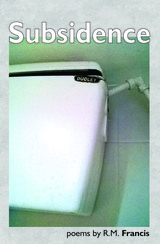Subsidence
RM Francis
Price: £7.99

The ground gives, the walls crack and our foundations are laid bare, revealing fragments of history, myth and memory we had forgotten once were ours. Subsidence is about the post-industrial Black Country landscape, where houses sink into old mines and the present collapses into the past beneath our feet. Written just before and after the 2016 Brexit referendum, these poems are love-songs to the dialect and culture of the Black Country, odes to working-class communities, and laments for the unwanted and off-kilter.
The buildings, stained by industry tears, scar those passing through. They wallow in rancid reflections of filthy windows and get caught – anaesthetised. They flee, but I like the dry-eyed, dirty face peering back behind the advertisements.
We ay from brumajum weem in the borderless pits – black be day red be night. Where baby rhymes with Rabbie – that old bard who kept the burn in his tongue. That burn connects, it burns like our old forges burned – burning trade and toil and song and burning a brand that yow know and yow know – burns like Saxon shamans who’s embers were stamped and pissed on by ministers of education immersed in double spayke – thass why weem taught to hayte those four letter words like fuck and cunt. Those words burn and words that burn sit, like us, in borderless pits, ready, with Blakean bows, to fight shot to shot – to burn back with our vernacular, thass why when my Auntie sez yow doh spayke proper ’er’s playing ‘er part in burning.
‘We’re all Middle Class now!’ Lord Prescott It’s always been the borderlands – borders we make, borders put upon us borders in the borders. Granddad holds forth about Kuala Lumpur conquests we’ve heard again and again. Nan does her duty. Old coals built them and their difference. Stambermill viaduct divides his growth: site of tissue bombs and resin bongs, graffiti wars between Baggies and Wolves. Looming grey bricks arch over plains where the Stour cuts industrial estates and municipal grasses where the kids, whose Dads were on the box after Kuwait, taught us porn and fags and illicit words. We weren’t quite as working as them – didn’t matter then. Paul moved south after Uni, e’ sez charnce and barth now, Linda told ’im – there ay an R in it, chance rhymes with pants. Old coals burn in tongues. The middle son boards with Mother, she could tell a tale – the only child of a factory wench and ex-guardsman, with council estate maisonette, the stench of salted meats and carbolic soap. Father, eldest of three in Post-War Semi, where tobacco, wine and classical music steep the scene. Watched his Mum die at seventeen, never says a word about it. Old coals, still subsiding. Their spawn, treading waters. Working enough for Pennfields, Middle enough for Pedmore – he ploughed a border. Nah, ’e’s alright, ’e knows Armitage but ’e’ll gerr’on the end of a cross with a minute of lunch to spare. Madge, who did her Tony Harrison thing, said a bit of honest vulgarity, better than them imagined pretentions. Old coal gets a spit polish. New builds and period homes mottled the other side of Stambermill, where the wraith of the viaduct is fogged. A grinning perjurer declares things can only get better. I doh like ’im, Nan says, ’e’s an hyena. ’Er was right. Old coal, old oil, old game. We had books, Dad subscribed to Reader’s Digest and demolished lit for fun – a big American firm took him on. Mum had her trinkets – corn dollies, porcelain mice – cultured a supermarket into a classroom. They had rows of Penguin books, neatly aligned amongst black and white family portraits and kitchens of locally sourced goods. Have you ever been anywhere outside Europe? We weren’t quite as Middle as them, we noticed that then.
Shut yo’ gob
with Aynuk-Ayli tales
we know the loff
of ’ow they mistook
salt for kaylie
an’ ’ow weem solute
to theya solvent.
Tell it to John
an’ ’is single mom
where there ay nothin’
but the glue
an’ markin’ tracks.
‘Is mon ‘s gone
an’ Mr Smith day
act on ’is ADHD
an’ there ay a wench
who’d tek on a jitterer,
an’ no toil for a wazzock.
All ’e’s got ‘s ’is front,
an’ yo’ wan’im to loff?
Shut yo’ gob.
So much depends upon
This is Art, spraycanned
on the redbrick shed
of the MEC
down in the maze
of Sledmere estate.
‘A love letter spoken in his mother tongue, refusing to be a second language, a vernacular ripe with the heart and soul of everyday people. This is an observation of both strangers an’ kin, sometimes smashed glass of people’s lives reflecting a beautiful constellation under a Black Country sky.’
Roy McFarlane
‘A glorious musical score of Black Country dialect with all its complex tone colours and rhythms. Borderlands of class, the liminal aching space occupied by those who are not easily categorised are cracked open and witnessed.’
Roz Goddard
‘He is our Black Country guide to the relics, rituals, coping strategies of a defunct working class. Defiantly vernacular, written in dialect, we encounter the mythic, Germanic smith Wieland and his descendants in their haunts of pub, car park, footy pitch and wasteland, held captive and hamstrung by a tyranny of class and prejudice.’
Bob Beagrie